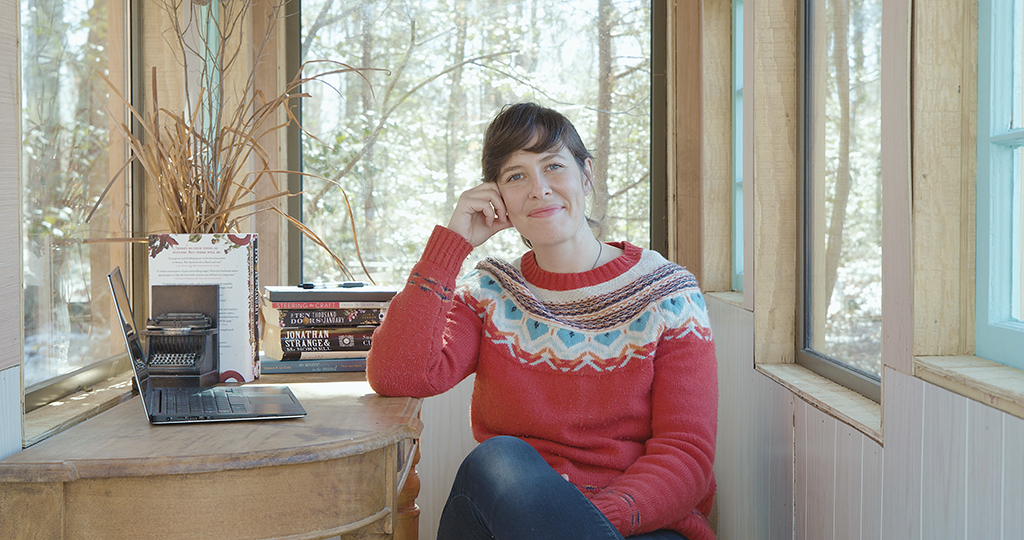For many people, there is a distinct line between fantasy and reality. There is the dream of ourselves, often formed in childhood, and there is the self that “reality” dictates in adulthood. Hugo Award-winning fantasy writer Alix Harrow ’09 knows that classic tension well but has managed to live her childhood dream of being a novelist.
And she did it rather quickly, becoming the youngest woman in the history of the Hugo Awards to be nominated for best novel. Her debut work, “The Ten Thousand Doors of January,” cements her place in literary history while proving that, yes, one can live out a childhood dream—so long as the playing field is level. From Harrow’s point of view, it’s certainly not.
“The only people who are really permitted to fully explore their passions are people from privileged backgrounds,” she explained, remembering what it was like to be a teenager with ambitions of writing.

Harrow was not from a privileged background. She watched her parents struggle to pay off student loan debt and saw a similar future for herself, a future of dreams cut short by the simple act of owing someone.
At 14, she realized, “I need to think a little more practically and think about the kind of lifestyle that I want to have,” she said. She was reading Poets and Writers magazine, and she understood, “Very few writers support themselves with their writing. They have spouses or they come from money. They are supported in some external way.”
Everybody else, young Harrow surmised, had to find “a real job.” Harrow raced through her high school curriculum at home and collected a diploma at 16. She worked at Baskin-Robbins and took classes at the local community college while envisioning herself somewhere among other elite students in the Ivy League.
“I really liked college classes, so I applied to a couple of different schools,” she recalled. “That was actually a really sobering time, applying to different colleges and realizing that if I got these great, lovely acceptance letters, it wouldn’t necessarily mean that I could pursue the kind of life I was hoping to have. It seemed unattainable.”
Berea College, though, offered her something different. The prospect of not having to borrow money to pay tuition gave her the freedom to pursue her passions, both while in school and afterward.
“Once I got into Berea,” Harrow said, “it felt like, ‘Alright, great, I’m signing up for art classes. I’m signing up for humanities classes. I going to study another language. I’m going to study abroad.’ I felt like I could have in some ways that ivy-covered campus that I had seen in movies.”
If tuition was free, we would have a vastly more equitable and just society. I think we would have a genuinely happier population of people who could pursue what they wanted for the reasons they wanted.
Alix Harrow ‘09
At Berea, Harrow gave tours of sustainable technology, worked as a research assistant to a professor and studied abroad in Mexico. She majored in history and graduated at the age of 19, without any debt to pay off.
“I was 19. I had a history degree, and I was in no hurry. I got a puppy. I lived in a van. I did migrant agricultural labor because I wanted to see the country. I fell in love with a guy who was raking blueberries, and he’s actually my husband. We did all these things that don’t sound very important, but they were formative to me.”
And she went to graduate school, landing a fellowship at the University of Vermont to pursue a master’s degree in history. Not having debt also meant that Harrow could work part-time as an adjunct instructor while writing her first novel.
“I don’t think I would be a novelist, or at least not a successful novelist, if I didn’t have a history degree and that chance to explore,” she said. Her second novel, “The Once and Future Witches,” was released in 2020 during a pandemic that reinforced Harrow’s belief in the value of the arts.
“It’s very easy to say we need more nurses, not novelists,” she said. “But I do think our collective identity is the stories that we tell about ourselves. Without that collective story-making, we’re kind of impoverishing our culture. Many of us are surviving this pandemic by relying on things like books and movies and streaming services and music. Those things apparently do have a significant value to us on a human level.”
Harrow imagines that if she had gone to another school, she would have been in substantial debt that would have limited her professional options. She hopes her children and others can have the same degree of freedom she had to explore her passions. But options like these, says Harrow, are limited to the privileged and the graduates of a little tuition-free school in Kentucky. For everyone else, the line between fantasy and reality is a stubborn hurdle.
“If tuition was free, we would have a vastly more equitable and just society,” she said. “I think we would have a genuinely happier population of people who could pursue what they wanted for the reasons that they wanted.”



I love Berea college